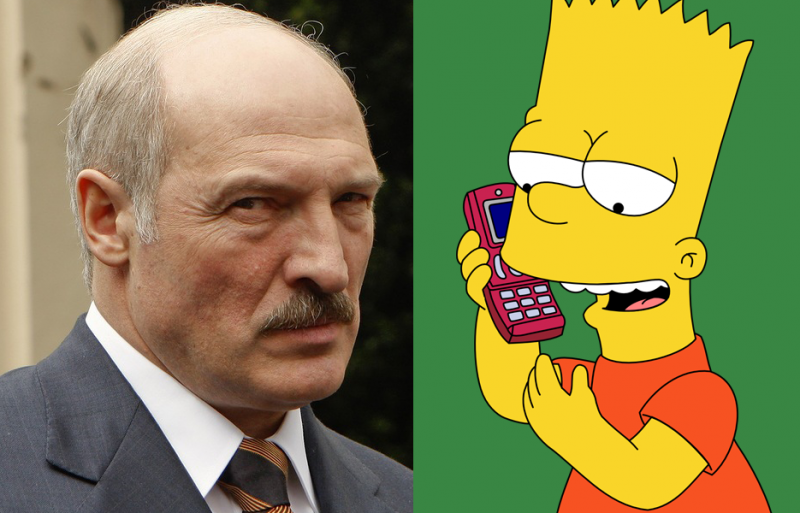
Lukashenko and Bart Sympson. Images remixed by Andrey Tselikov.
Fans of Bart Simpson's prank calls to Moe's Tavern may be happy to find out that Russia has an enormous online community devoted to telephone pranks, not all of them as innocent. “Prankery” or “prankers” are a bustling online subculture, well established by 2009, when they were described by urban anthropologist Mikhail Alekseevskiy in Russian Academy of Sciences collection of articles on “Moscow Youth Subcultures.”
Although similar in spirit to simple prank calls beloved by many since the advent of the phone, Russia's prankers have reached a wider audience than usual, by posting the results of their calls on the Internet, first on dedicated forums, and later on social networks like VKontakte. In 2009 they were more interested in finding regular people to prank — preying particularly on older men and women, who they would call over and over, goading them into obscene tirades, which would be recorded and turned into local memes. In effect, this constituted “real life trolling” — an analog analogue to image boards like 4chan's infamous /b/.
But even back then, prankers pranked celebrities, and the most successful of them became celebrities of their own. A pranker who goes by “Vovan” is one such celebrity, a member of the pranker elite and a politically motivated troll who concentrates on making funny phone calls to well known people. In 2011, for example, he called up the head of the Russian Electoral Committee, Churov, claiming to be calling from the President's Administration, and fired him over the phone. This spring Vovan pranked Crimea's newly famous prosecutor general Natalia Poklonskaya, also claiming that he was calling from the President's office, and offering her to do a racy photo-shoot in Maxim.
Recently, however, Vovan might have overstepped his boundaries, when he prank-called Belorussian President Aleksandr Lukashenko, claiming to be the son of deposed Ukraine President Victor Yanukovich. During the call, the fake son asked Lukashenko for political refuge for his father. Lukashenko was sympathetic to the idea. After Lukashenko found out he was a victim of a prank, he apparently gave his security apparatus “a week” to find Vovan and bring him to some form of justice. Since it is likely that Vovan is a Russian citizen, it is unclear what such justice would entail.
Interestingly, while Vovan has admitted to making the call on his VKontakte page, he also said that he wasn't the one who leaked it to Ukrainian journalist Mustapha Nayem (who first broke the news). In fact, Vovan says that the particular recording leaked to Nayem began before he placed the call, and that Nayem did not appear to realize it was a prank. Which begs a logical conclusion, says Vovan, that someone was wire-tapping the President of Belarus. These wire-tappers were, in fact, also pranked:
Эти “слушатели” дали осечку – они не поняли, что с Лукашенко разговаривает совсем не сын Януковича и приняли разговор за реальный. После чего, возможно, они слили данную запись киевским властям. А те в свою очередь, тоже не разобрав подвоха, придали гласности этот “сенсационный” разговор через близкого к ним журналиста Найема.
These listeners made a mistake — they didn't realize that Lukashenko wasn't actually talking to Yanukovich's son, and thought the conversation was genuine. After this they, perhaps, leaked the recording to the powers in Kiev. Who, in turn, without realizing the scam, publicized this “sensational” conversation through Nayem, who is close to them.
If this is true, and it is this easy to cause an international scandal, we may have entered a brave new world of telephone pranks. Let's hope Russian “Barts” can keep up.








1 comment